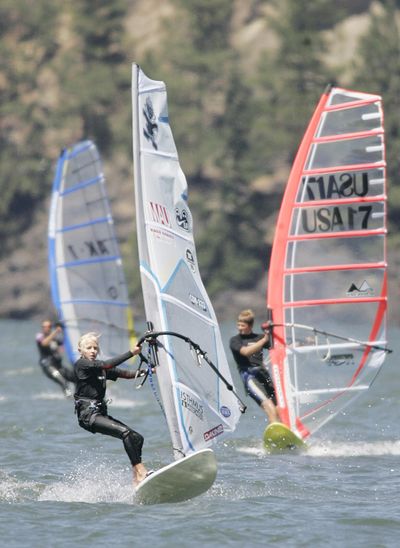Environmentalists trying to stop wakeboarding park

Developer Bob Naito thought he was putting together a green project that would fit great with the outdoor recreation so popular in Hood River, the Oregon town known for world-class windsurfing, craft beer and fruit orchards in the Columbia Gorge.
The Portland-based Naito Development LLC plans to build a waterfront hotel and commercial building – both certified as sustainable – along with Oregon’s first wakeboarding park in a cove that had to go through a major pollution cleanup in 2006 after a barge-building works closed down.
Naito Development is known for its work on certified sustainable and historic buildings.
But some environmentalists are trying to scuttle the Hood River project. And the objections are most vehement against the wakeboarding park, where people on wakeboards and water skis are pulled around by cables powered by electric motors.
They have appealed the City Council’s approval of the project to a state land use board, and are threatening to file a federal lawsuit claiming the project threatens endangered salmon and clean water in the Columbia River. Notices of intent to sue argue the project would send dirty stormwater runoff into the river, and take away a resting spot for young salmon migrating to the ocean.
“In many ways it is a battle for the soul of Hood River,” said Brent Foster, the attorney for Friends of the Hood River Waterfront, Center for Biological Diversity and Northwest Environmental Defense Center.
Foster is the former executive director of Columbia Riverkeeper and was the top environmental aide to former state attorney general John Kroger. He particularly objects to plans to build what is also known as a cable park in a sheltered area regularly used by kayakers, paddle boarders and local triathletes.
“Windsurfing, kite boarding and mountain biking and other non-motorized sports have been Hood River’s bread and butter,” he said. “Cable parks are along the lines of what you find in Daytona Beach.
Hood River was a fruit farming and timber town when the collapse of the timber industry put it on hard times in the 1980s. Then world-class windsurfers like Maui Meyer discovered it, and it has become a destination for outdoor recreation.
Meyer, who is now a county commissioner, said he stood “shoulder to shoulder” with Foster on a variety of conservation issues over the years, but disagrees with his arguments against the project. Meyer said there is a shortage of hotel and office space in town that the project would address.
Naito said he bought the former Nichols Boat Works site in 2007 after the state finished cleaning it up, and originally planned to build a marina along with the hotel and commercial building. But flooding deposited a sandbar that closed off the site from the river. Then someone in Hood River suggested the idea of the cable park.
“It replaces all those wakeboarding ski-boats, so it seemed to us it was a pretty clever environmental thing that kind of fit in with Hood River …”
Naito said the wakeboard park serves as a draw that will help make the hotel and commercial building profitable in less time, but ultimately, the project can stand without it.